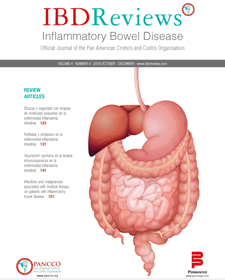Impact of immunomodulatory therapy in chronic inflammatory bowel disease
Contenido principal del artículo
Resumen
Patients with inflammatory bowel disease (IBD) are at high risk of side effects related to steroid use, and often enough, disease flares cannot be treated alone with them. Recent studies have tried to assess the effectiveness of immunomodulators and biological agents in maintaining or inducing remission. The fine balance between full clinical benefit and reduction of adverse events is kept only by constant medical evaluations and regular notice of complications. Thiopurines (such as azathioprine [AZA] and 6-mercaptopurine) and methotrexate (MTX) have been widely tested in the induction of remission or remission maintenance of IBD. While MTX is highly beneficial at inducing remission in CD, monotherapy in UC was proven not be effective at all. In addition to the former findings, MTX in combination therapy with biological agents has had unsatisfactory outcomes. In contrast to MTX, AZA has more substantial evidence supporting its use in moderate-to-severe IBD. AZA alone or in combination possess high efficiency in UC and CD. Despite the clear success of combination therapy with AZA or immunomodulators alone in IBD, the potential disadvantages are still vast, ranging from opportunistic infections to neoplasm proliferation.

